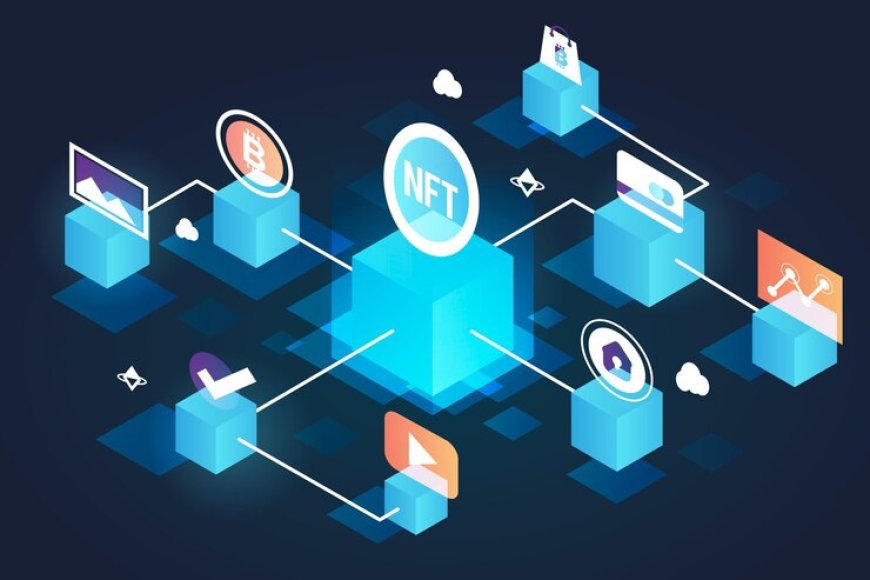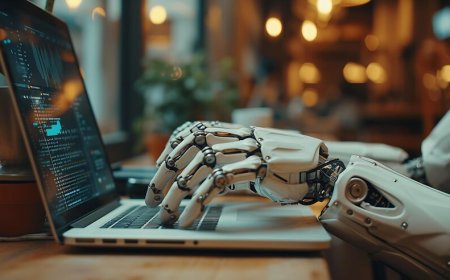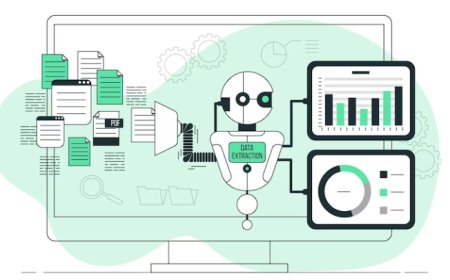The Fusion of Blockchain and Machine Learning
Discover blockchain, machine learning, integration, data security, algorithms, innovation, AI, decentralized, technology, analytics, future trends.

Imagine a world where the power of blockchain technology and machine learning are combined to create a revolutionary new way of doing things. This fusion has the potential to transform industries and change the way we live our lives. With blockchain's ability to securely store and share data, and machine learning's ability to analyze and make predictions based on that data, the possibilities are endless. From finance to healthcare, from transportation to education, this combination has the potential to revolutionize the way we do business and interact with the world around us. The future is bright for the fusion of blockchain and machine learning, and we can't wait to see what it holds.
As the worlds of blockchain and machine learning collide, complexities arise. Integrating these technologies seamlessly poses challenges, from ensuring scalability to addressing interoperability concerns. Organizations grapple with how to harness the power of both technologies without succumbing to potential pitfalls. The intricate dance between the decentralized and immutable nature of blockchain and the adaptive learning capabilities of machine learning requires careful navigation. Moreover, the question of how this fusion will impact various industries and if it can overcome the hurdles in its path demands exploration.
How Do Blockchain and Machine Learning Collaborate to Create a Synergistic Future?
To comprehend the collaboration between blockchain and machine learning, we'll delve into specific aspects where their synergy is most pronounced. From enhanced data security to decentralized machine learning models, the possibilities are vast. How does the immutability of blockchain contribute to machine learning's predictive analytics, and what applications does this fusion hold across diverse sectors?
The Synergy Across Industries
1. Enhanced Data Security: A Fortified Foundation
-
Blockchain's Decentralization: The decentralized nature of blockchain ensures that data is not stored in a central repository, mitigating the risk of a single point of failure.
-
Machine Learning for Threat Detection: Integrating machine learning algorithms enhances data security by identifying anomalies and potential threats in real-time, adding a layer of proactive defense.
2. Immutable Data Records: Empowering Predictive Analytics
-
Blockchain's Immutability: Immutability guarantees that once data is recorded, it remains unchanged, providing a reliable historical record.
-
Machine Learning for Pattern Recognition: Machine learning algorithms leverage this historical data to identify patterns, empowering predictive analytics and informed decision-making.
3. Decentralized Machine Learning Models: Privacy and Collaboration
-
Blockchain's Decentralization for Privacy: Decentralized machine learning models, distributed across a network, ensure that sensitive data remains localized.
-
Machine Learning for Collaborative Research: Decentralization facilitates collaborative medical research, respecting data privacy and fostering advancements in healthcare.
4. Smart Contracts for Automation: Transparency and Efficiency
-
Blockchain's Smart Contracts: Smart contracts automate and enforce predefined rules in a transparent and decentralized manner.
-
Machine Learning for Automated Decision-Making: Integration with machine learning allows smart contracts to make automated decisions based on real-time data analysis, enhancing efficiency.
Challenges and Considerations in the Fusion:
While the synergy between blockchain and machine learning is promising, challenges persist. Scalability and interoperability issues need to be addressed for widespread adoption. The resource-intensive nature of both technologies demands innovative solutions to ensure smooth integration. Industry standards and protocols must be established to enhance interoperability and streamline the collaborative potential of these technologies.
Importance of the Fusion:
Enhanced Security:
In the evolving landscape of digital transactions and data management, the fusion of blockchain and machine learning stands as a formidable solution to enhance security. The decentralized structure inherent in blockchain technology plays a pivotal role in ensuring data security. By eliminating reliance on a single point of control or failure, blockchain creates a network of nodes that collectively authenticate and validate transactions. This decentralized trust fundamentally reshapes traditional security paradigms, providing a robust foundation for safeguarding sensitive information.
Complementing blockchain's decentralized security is machine learning's prowess in anomaly detection. Machine learning algorithms continuously monitor data streams, identifying irregularities and potential threats in real-time. This proactive approach fortifies security measures by enabling swift responses to emerging risks. The integration of machine learning with blockchain not only strengthens the overall security architecture but also introduces a dynamic layer of adaptability to evolving cybersecurity challenges.
Predictive Analytics and Informed Decision-Making:
At the heart of the fusion lies the power to transform data into actionable insights, driving predictive analytics and informed decision-making. Blockchain's immutability, which ensures that once data is recorded, it cannot be altered, creates a reliable historical record. This immutable data foundation becomes instrumental in predictive analytics, allowing machine learning algorithms to analyze historical patterns and trends. The synergy between blockchain's immutability and machine learning's analytical capabilities empowers organizations to make data-driven decisions with a high degree of confidence.
Machine learning algorithms further leverage historical data for pattern recognition, extracting meaningful insights that contribute to informed decision-making. Whether predicting market trends, identifying potential risks, or optimizing operational processes, the fusion of blockchain and machine learning positions organizations to navigate complex data landscapes with agility and precision. The combination of immutable data and predictive analytics becomes a strategic asset for organizations seeking a competitive edge in their respective industries.
Privacy and Collaboration:
In the age of data privacy concerns, the fusion of blockchain and machine learning introduces a paradigm shift in how sensitive information is handled. Blockchain's decentralized privacy mechanisms redefine data storage practices. By ensuring decentralized and secure data storage, blockchain mitigates the risks associated with centralized repositories. This decentralized privacy architecture not only preserves individual data privacy but also establishes a foundation of trust between parties engaging in transactions or collaborations.
The collaboration extends to decentralized machine learning models, particularly impactful in sectors like healthcare and research. These models foster collaboration by allowing multiple stakeholders to contribute to and benefit from machine learning insights without compromising data privacy. By respecting data privacy while promoting collaboration, the fusion of decentralized machine learning models and blockchain technology opens new frontiers for innovation and knowledge-sharing in traditionally sensitive domains.
Transparent and Efficient Automation:
One of the transformative aspects of the fusion lies in the realm of transparent and efficient automation, facilitated by smart contracts. Blockchain's smart contracts automate processes in a transparent and tamper-resistant manner. This transparency ensures that contractual terms are executed as intended, reducing the need for intermediaries and enhancing overall operational efficiency.
Integrating machine learning into smart contracts elevates automation to a new level. Machine learning algorithms, driven by real-time data analysis, enable automated decision-making within the smart contract framework. This not only streamlines processes but also enhances the adaptability of automated actions based on evolving data patterns. The fusion of machine learning and blockchain in smart contracts exemplifies the potential for technologies to work synergistically, offering a transparent, efficient, and adaptive approach to automation.
Tips for Successful Integration:
Clearly Defined Objectives:
-
Clearly define the objectives of integrating blockchain and machine learning to align with business goals.
-
Establish a roadmap for integration, outlining specific use cases and expected outcomes.
Interdisciplinary Collaboration:
-
Encourage collaboration between blockchain experts and machine learning specialists for a holistic approach.
-
Foster a culture of cross-disciplinary communication to address challenges and optimize integration.
Scalability Planning:
-
Consider scalability from the outset to accommodate the potential growth in data volume and computational requirements.
-
Evaluate solutions that offer scalability without compromising performance.
Data Quality and Standardization:
-
Ensure data quality and standardization across blockchain and machine learning processes.
-
Implement protocols for data cleaning and normalization to maintain accuracy in analytics.
Security Measures:
-
Prioritize security protocols for both blockchain and machine learning components.
-
Regularly update security measures to address evolving threats and vulnerabilities.
Continuous Monitoring and Optimization:
-
Implement monitoring systems to track the performance of integrated solutions.
-
Continuously optimize algorithms and processes based on real-time insights and evolving business requirements.
Adoption of Industry Standards:
-
Stay informed about industry standards and protocols related to blockchain and machine learning integration.
-
Adhere to these standards to ensure interoperability and compatibility with emerging technologies.
Ethical Considerations:
-
Address ethical considerations related to data privacy, transparency, and accountability.
-
Establish ethical guidelines for the use of machine learning algorithms, particularly in sensitive industries such as healthcare.
User Education and Training:
-
Provide training sessions to educate users and stakeholders about the integrated system.
-
Promote a user-friendly interface and ensure that team members are proficient in utilizing the combined technologies.
Agile Approach:
-
Adopt an agile approach to development and integration.
-
Be flexible and ready to adapt the integration based on feedback, technological advancements, and changing business requirements.
As we navigate this transformative landscape, the fusion of blockchain and machine learning holds immense potential. The journey is not without challenges, but with ongoing research, innovation, and collaborative efforts, the road ahead is promising. The transformative impact on finance, healthcare, supply chain management, and more showcases the far-reaching implications of this collaboration.
The fusion of blockchain and machine learning propels us into a future where data is secure, decisions are automated, and industries are transformed. The collaboration between decentralized ledgers and analytical algorithms is not just a technological evolution; it's a paradigm shift that promises efficiency, transparency, and innovation across diverse sectors. While challenges persist, the potential benefits underscore the significance of embracing this synergistic future. As we stand at the intersection of blockchain and machine learning, the journey forward holds the promise of reshaping how we interact with data and technology, paving the way for a future defined by collaboration and boundless possibilities.




































